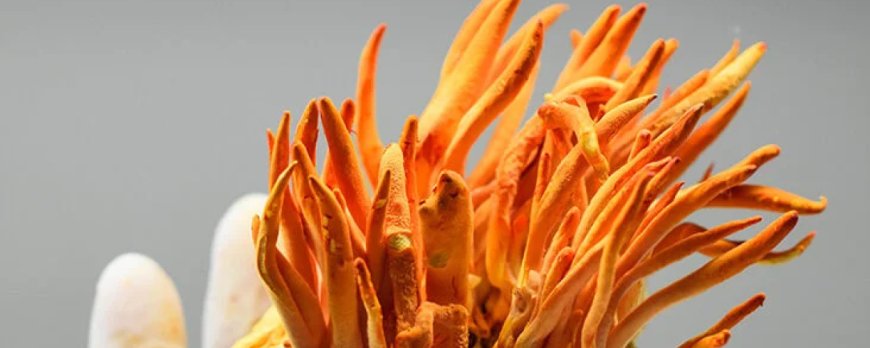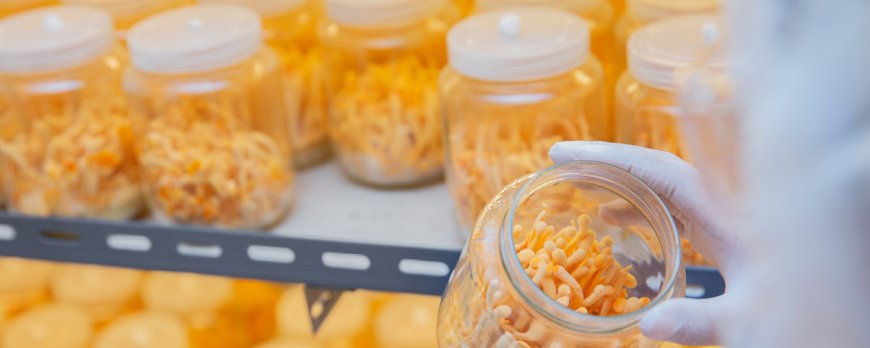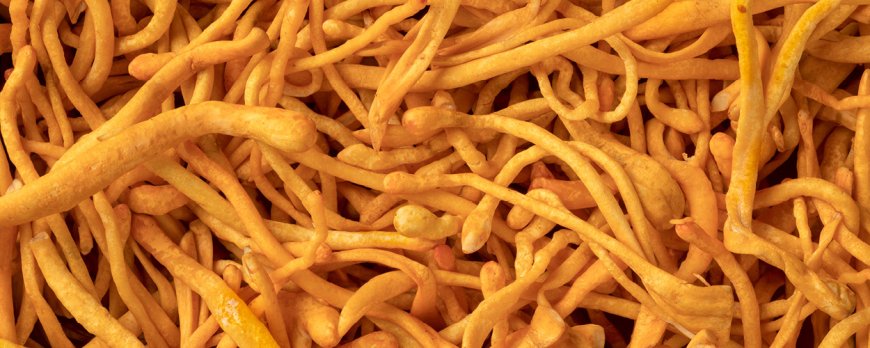How can you determine the quality of cordyceps supplements?
Explore answers to 'How can you determine the quality of cordyceps supplements?' Learn about factors influencing potency and effective assessment methods.

How Can You Determine the Quality of Cordyceps Supplements?
When it comes to cordyceps supplements, determining their quality can be a complex task, especially considering the prevalence of counterfeit products in the market. With so many options available, it's essential to know how to assess the authenticity and purity of these supplements to ensure their effectiveness.
Key Takeaways:
- Analyzing the chemical markers present in cordyceps supplements, such as cordycepin and D-mannitol, can help determine their authenticity.
- Methods like HPLC-MS/MS are used to identify and quantify these markers in the supplement.
- Mycelium-based substitutes are common in the market and can be mistaken for authentic Cordyceps sinensis.
- Verifying the authenticity and purity of cordyceps supplements is crucial for ensuring their efficacy.
- Consumers should consider factors like sourcing, manufacturing practices, and certifications when selecting high-quality cordyceps supplements.

Factors to Consider for Cordyceps Supplements Quality
There are several key factors to consider when evaluating the quality of cordyceps supplements. One effective method is to analyze the chemical markers present in the supplement using techniques like HPLC-MS/MS. These markers can provide valuable insights into the authenticity and purity of the supplement. Cordycepin and D-mannitol are two specific compounds that serve as reliable quality indicators for authentic cordyceps. By assessing the presence and quantity of these markers, consumers can ensure that they are purchasing a high-quality product.
It is crucial to note that a significant number of cordyceps products available in the market are not genuine Cordyceps sinensis, but instead, they are mycelium-based substitutes. These substitutes are produced by growing mycelium in liquid fermentation tanks or on grain substrates. When evaluating the quality of cordyceps supplements, it becomes essential to verify their authenticity and purity. Only through this verification process can consumers ensure the effectiveness of the product and avoid purchasing inferior substitutes.
When considering the authenticity and purity of cordyceps supplements, it is also essential to be aware of the manufacturing processes involved. The production method can have a significant impact on the quality of the final product. It is advisable to choose supplements that undergo rigorous quality control measures, including third-party testing and certification. Additionally, transparency and clear labeling of ingredients can provide consumers with confidence in the product's authenticity and quality.
Factors to Consider:
- Chemical marker analysis: Analyzing the presence and quantity of cordycepin and D-mannitol.
- Authenticity and purity verification: Ensuring the supplement is genuine Cordyceps sinensis and free from contaminants.
- Manufacturing processes: Choosing supplements that undergo rigorous quality control measures and have transparent labeling.
Assessing the Purity of Cordyceps Supplements
The purity of cordyceps supplements plays a crucial role in their overall quality and effectiveness. When evaluating the purity of these supplements, it is important to consider several factors:
- Source and cultivation: Check if the manufacturer provides information about the source of their cordyceps and the cultivation methods used. Genuine Cordyceps sinensis is a rare species that grows naturally in high-altitude regions. If the product claims to be wild-harvested, ensure that it comes from reputable sources to avoid counterfeit or low-quality substitutes.
- Chemical marker analysis: Analyzing the presence and quantity of specific chemical markers, such as cordycepin and D-mannitol, can help determine the authenticity of cordyceps supplements. These markers are unique to Cordyceps sinensis and can indicate the purity of the product. Look for supplements that have undergone rigorous testing using techniques like HPLC-MS/MS.
If you are unsure about the authenticity or purity of a cordyceps supplement, it is recommended to consult with a healthcare professional or a reputable supplier who can provide detailed information about their product's quality assurance processes.
Verifying the Authenticity and Purity of Cordyceps Supplements
To ensure the authenticity and purity of cordyceps supplements, consider the following steps:
- Research the reputation and track record of the manufacturer or supplier.
- Look for certifications or third-party testing reports that attest to the quality and authenticity of the product.
- Read customer reviews and testimonials to gauge the satisfaction and experiences of other users.
By taking these steps, you can have greater confidence in the quality and effectiveness of the cordyceps supplement you choose.

Evaluating Cordyceps Supplements for Authenticity
With the prevalence of counterfeit cordyceps products, it is essential to evaluate their authenticity to ensure you are getting a genuine product. Determining the authenticity of cordyceps supplements can be a complex task, but there are several factors to consider that can help you make an informed decision.
One method for verifying the authenticity of cordyceps supplements is to analyze the chemical markers present in the product. High-performance liquid chromatography coupled with mass spectrometry (HPLC-MS/MS) is a commonly used technique that can detect specific compounds, such as cordycepin and D-mannitol, which serve as quality indicators for authentic cordyceps. By assessing the presence and quantity of these markers, you can gain insights into the purity and authenticity of the supplement.
It is crucial to note that the majority of cordyceps products in the market are not genuine Cordyceps sinensis but rather mycelium-based substitutes. These substitutes are produced by growing mycelium in liquid fermentation tanks or on grain substrates. To ensure you are purchasing a high-quality cordyceps supplement, it is important to thoroughly research the product and verify its authenticity and purity. Look for reputable brands that provide transparency in their sourcing and manufacturing processes.
When evaluating cordyceps supplements, it is also helpful to look for certifications or third-party testing. Trustworthy brands often undergo independent testing to verify the authenticity and purity of their products. Additionally, consider reading customer reviews and seeking recommendations from trusted sources to further validate the quality of the supplement. By taking these steps, you can have confidence in the authenticity and effectiveness of the cordyceps supplement you choose.
Chemical Marker Analysis for Cordyceps Supplements
Chemical marker analysis is a crucial method for determining the quality and authenticity of cordyceps supplements. By analyzing the chemical markers present in the supplement, such as cordycepin and D-mannitol, consumers can assess their authenticity and overall quality. These compounds serve as reliable indicators of genuine Cordyceps sinensis, ensuring that the supplement provides the desired health benefits.
When evaluating cordyceps supplements, it is important to assess the presence and quantity of these chemical markers. High-quality products will contain adequate levels of cordycepin and D-mannitol, indicating that they are made from authentic Cordyceps sinensis. However, it is crucial to be aware that the majority of cordyceps products in the market are not genuine, but rather mycelium-based substitutes.
Mycelium-based substitutes are produced by growing mycelium in liquid fermentation tanks or on grain substrates. As a result, these products lack the same chemical composition and therapeutic properties as authentic Cordyceps sinensis. To ensure that consumers are getting the desired health benefits, it is essential to verify the authenticity and purity of cordyceps supplements before making a purchase.
By utilizing chemical marker analysis, individuals can make informed decisions about which cordyceps supplement to choose. This method allows for a more thorough assessment of the product's quality and authenticity, providing peace of mind to consumers seeking the benefits of genuine Cordyceps sinensis. Taking the time to analyze the chemical markers present in the supplement can help ensure the highest quality and effectiveness of cordyceps supplements.
Cordycepin and D-Mannitol as Quality Indicators
Cordycepin and D-mannitol are important compounds that can serve as quality indicators in cordyceps supplements. Analyzing the presence and quantity of these compounds can help determine the authenticity and quality of the supplement. Cordycepin is a unique bioactive compound found in Cordyceps sinensis and has been associated with various health benefits, such as immune support and antioxidant properties. Its presence in a cordyceps supplement indicates that it contains genuine Cordyceps sinensis.
D-mannitol is a sugar alcohol that is naturally present in Cordyceps sinensis. Its presence in a cordyceps supplement can also be used as an indicator of authenticity and quality. Both cordycepin and D-mannitol can be analyzed using techniques like High-Performance Liquid Chromatography coupled with Mass Spectrometry (HPLC-MS/MS) to assess their content in the supplement.
When evaluating cordyceps supplements, it is important to look for products that provide information about the presence and quantity of cordycepin and D-mannitol. This information can help consumers make informed decisions about the quality and authenticity of the supplement. Additionally, it is essential to verify the source and manufacturing process to ensure that the product is not a mycelium-based substitute. Mycelium-based substitutes are often marketed as cordyceps supplements but lack the same bioactive compounds found in genuine Cordyceps sinensis, resulting in reduced efficacy.
By understanding the significance of cordycepin and D-mannitol as quality indicators and being vigilant about the authenticity of cordyceps supplements, consumers can choose high-quality products that offer the potential health benefits associated with Cordyceps sinensis.

Mycelium-Based Cordyceps Substitutes
Many cordyceps products in the market are not genuine Cordyceps sinensis but instead rely on mycelium-based substitutes. These substitutes are produced by growing mycelium in liquid fermentation tanks or on grain substrates. While they may contain some beneficial compounds, they are not considered as effective as the authentic Cordyceps sinensis.
It is important for consumers to be aware of these mycelium-based substitutes and to distinguish them from the genuine Cordyceps sinensis. The packaging and labeling of cordyceps supplements may sometimes be misleading, making it essential to carefully read the product details and verify the authenticity and purity of the supplement.
When selecting cordyceps supplements, it is recommended to look for products that clearly state "Cordyceps sinensis" or "Cordyceps militaris" on the label. These species are known for their potency and effectiveness. Additionally, choosing supplements that undergo rigorous quality testing and adhere to Good Manufacturing Practices (GMP) can help ensure their authenticity and quality.
Verifying the Authenticity and Purity of Cordyceps Supplements
To ensure you are getting a high-quality cordyceps supplement, it is crucial to verify both its authenticity and purity. Determining the authenticity of cordyceps supplements can be challenging, as many products on the market are not genuine Cordyceps sinensis but are instead mycelium-based substitutes. These substitutes are produced by growing mycelium in liquid fermentation tanks or on grain substrates. Therefore, it is important to differentiate between authentic cordyceps and mycelium-based substitutes.
One way to verify the authenticity of cordyceps supplements is by analyzing the chemical markers present in the product. Techniques like HPLC-MS/MS can be used to identify specific compounds that serve as indicators of authentic cordyceps, such as cordycepin and D-mannitol. These markers are naturally present in genuine Cordyceps sinensis and their presence and quantity can help determine the product's authenticity.
Aside from authenticity, assessing the purity of cordyceps supplements is equally important. Purity refers to the absence of contaminants or adulterants in the product. To ensure purity, it is essential to verify that the supplement has undergone rigorous quality control measures and tests for contaminants such as heavy metals, pesticides, and microbial contaminants. Look for products that provide detailed information on their manufacturing processes and have third-party lab testing to confirm their purity.
In summary, authentic and pure cordyceps supplements can provide the desired health benefits. To ensure you are getting a high-quality product, it is crucial to verify both its authenticity and purity. Analyzing the chemical markers, such as cordycepin and D-mannitol, can help determine the authenticity of the supplement. Additionally, checking for rigorous quality control measures and third-party lab testing can ensure its purity. By taking these steps, you can confidently choose a cordyceps supplement that will deliver the intended effects.
Tips for Choosing High-Quality Cordyceps Supplements
Choosing the right cordyceps supplement can be daunting, but with these tips, you can confidently make an informed decision. Here are some factors to consider when selecting a high-quality cordyceps supplement:
- Source and authenticity: Look for supplements that are sourced from authentic Cordyceps sinensis mushrooms. Check if the product has been tested for authenticity and verify that it contains the specific chemical markers, such as cordycepin and D-mannitol, which indicate the presence of genuine cordyceps.
- Purity and potency: Assess the purity and potency of the supplement by checking for third-party lab testing. Look for products that are free from contaminants, additives, and fillers, ensuring that you are getting a pure and potent form of cordyceps.
- Extraction method: Consider the extraction method used to obtain the active compounds from cordyceps. Look for supplements that use advanced extraction techniques like dual extraction, which ensures the extraction of both water-soluble and alcohol-soluble compounds for maximum effectiveness.
- Reputable brand: Choose a supplement from a reputable brand that follows good manufacturing practices. Look for brands that have a positive reputation, transparent labeling, and a commitment to quality and safety.
Remember to consult with a healthcare professional before starting any new supplement regimen, especially if you have any underlying health conditions or are taking medication. By considering these tips, you can confidently choose a high-quality cordyceps supplement that meets your specific needs and provides optimal benefits.

Effective Assessment Methods for Cordyceps Supplements
There are several assessment methods that can help you determine the quality and potency of cordyceps supplements. One effective approach is to analyze the chemical markers present in the supplement using advanced techniques such as High-Performance Liquid Chromatography-Tandem Mass Spectrometry (HPLC-MS/MS). This method allows for the identification and quantification of specific compounds, including cordycepin and D-mannitol, which are considered key indicators of authenticity in cordyceps supplements.
When assessing the quality of cordyceps supplements, it is essential to verify the presence and quantity of these chemical markers. Authentic cordyceps supplements should contain significant levels of cordycepin and D-mannitol to ensure their efficacy. However, it's important to note that many products on the market labeled as cordyceps are actually mycelium-based substitutes.
Mycelium-based substitutes are produced by cultivating the mycelium of Cordyceps sinensis in liquid fermentation tanks or on grain substrates. These products, while they may have their own health benefits, are not genuine Cordyceps sinensis. It is crucial to verify the authenticity and purity of cordyceps supplements to ensure you are getting the desired effects.
By employing effective assessment methods and verifying the authenticity and purity of cordyceps supplements, you can make informed decisions when selecting the right product for your needs. Look for trusted brands that provide transparency about their manufacturing processes and use independent third-party testing to validate the quality of their supplements. Taking these steps will help you ensure that you are getting a high-quality cordyceps supplement that can potentially offer the desired health benefits.
Conclusion
In conclusion, evaluating the quality of cordyceps supplements is crucial to ensure their authenticity, purity, and effectiveness. By considering various factors and using effective assessment methods, consumers can make informed choices and select high-quality cordyceps supplements.
One method for determining the quality of cordyceps supplements is to analyze the chemical markers present in the product using techniques like HPLC-MS/MS. Compounds such as cordycepin and D-mannitol can serve as effective markers for authentic cordyceps, and assessing their presence and quantity can help ensure the supplement's quality.
It is important to note that the majority of cordyceps products on the market are not genuine Cordyceps sinensis but are mycelium-based substitutes. These substitutes are produced by growing mycelium in liquid fermentation tanks or on grain substrates. Therefore, it is essential for consumers to verify the authenticity and purity of cordyceps supplements to ensure their effectiveness.
By following these tips and considering the information provided, consumers can confidently choose high-quality cordyceps supplements that meet their needs. Remember to always assess the authenticity, purity, and effectiveness of the product before making a purchase to ensure the best possible results.


































































































































